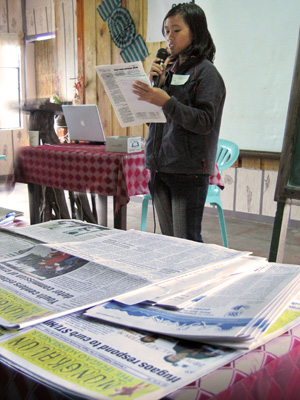
Day 1 session's first brave volunteer reading
news selection; trusty old MBP in the background.
news selection; trusty old MBP in the background.
Thrice postponed, this workshop was something that grew on me, as I intended my appearance mostly in support of my colleague's writing segment only; the design and layout component would be a postscript to that workshop, unless the participants relayed further interest in the design and layout aspect of publishing a newsletter, which meant I had to be prepared with something; I normally can give an impromptu talk on the publishing process, as I had done in some previous workshops anyhow.
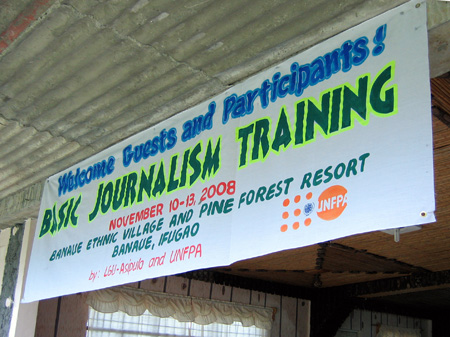
This workshop later transformed into a tightly-planned, full-blown editorial and publications seminar because the organizers, the municipality of Asipulo, Ifugao, backed by funding from the UNFPA, intended a 3-day workshop to be participated in by 40 attendees from both the local government unit and selected high school students and their advisers.
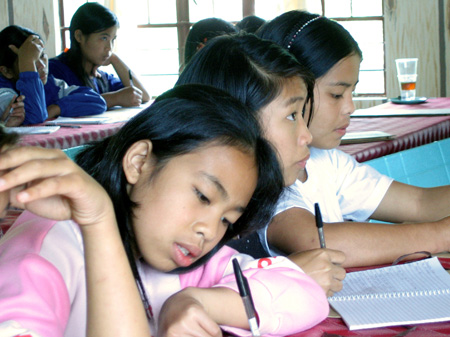
What transpired on Nov. 10-12, the final schedule, would be part of a series of workshops to the Ifugaos, the fourth held so this year in the province, by my colleague and I. What makes this different from the first three is that the activity was organized by the local government, with teachers and students formally attending alongside municipal employees.

This particular workshop's budget had to be reduced at some point: the intended 40 heads came down to about 33; the venue was moved from Isabela Province to Banaue, and the number of days reduced to two, from what would have been three straight seminar days. Having it in Banaue was probably the best decision the organizers made, especially since they also transferred the venue from Banaue town to a resort located in Aparanga-o, or 7 kms. north of the town center. There, I got to meet Doe, a female deer, yes, owned and tended by the resort owner himself, Andres Dunuan, a genteel and gentleman farmer who really was a former mayor of Hungduan. Mayor Andres married a softspoken Banaue lady and made their base there upon his retirement.

A welcome banner is a nice touch.
This workshop later transformed into a tightly-planned, full-blown editorial and publications seminar because the organizers, the municipality of Asipulo, Ifugao, backed by funding from the UNFPA, intended a 3-day workshop to be participated in by 40 attendees from both the local government unit and selected high school students and their advisers.

Ready and attentive, the selected high school students
will be staff members of their school newsletter.
(Photo by Isabel Templo)
will be staff members of their school newsletter.
(Photo by Isabel Templo)
What transpired on Nov. 10-12, the final schedule, would be part of a series of workshops to the Ifugaos, the fourth held so this year in the province, by my colleague and I. What makes this different from the first three is that the activity was organized by the local government, with teachers and students formally attending alongside municipal employees.

The first of three batches from different national
high schools of Asipulo who made it to the first-day session.
high schools of Asipulo who made it to the first-day session.
This particular workshop's budget had to be reduced at some point: the intended 40 heads came down to about 33; the venue was moved from Isabela Province to Banaue, and the number of days reduced to two, from what would have been three straight seminar days. Having it in Banaue was probably the best decision the organizers made, especially since they also transferred the venue from Banaue town to a resort located in Aparanga-o, or 7 kms. north of the town center. There, I got to meet Doe, a female deer, yes, owned and tended by the resort owner himself, Andres Dunuan, a genteel and gentleman farmer who really was a former mayor of Hungduan. Mayor Andres married a softspoken Banaue lady and made their base there upon his retirement.

Andres Dunuan, former Hungduan mayor, farmer, resort owner
and articulate guide to the resort's living museum exhibit
Interacting with Ifugaos in formal and informal events is always fulfilling in the sense that not only are they warm and hospitable, they are also very polite and are eager learners who, in turn, share their lives through their stories.

No time wasted discussing an assignment during dinner break
From all workshops handled thus far, I found the majority of Ifugao youth inquisitive yet mostly quiet and go about tasks assigned to them without ado. They are keen observers who know how to enjoy themselves and be in the moment. The older ones are mostly quiet, too, preoccupied with physical work or wrapped in their thoughts, but answer queries in simple and direct terms.

Lunchtime chill outside of seminar venue, almost visibility
zero past the path going up to the highway.
We were billeted in a separate cottage because it is the only one equipped with hot shower. But the shower only warmed the water at best, and lasted only about 5 minutes when I used it. The heating device was a total no-match to the cold weather.
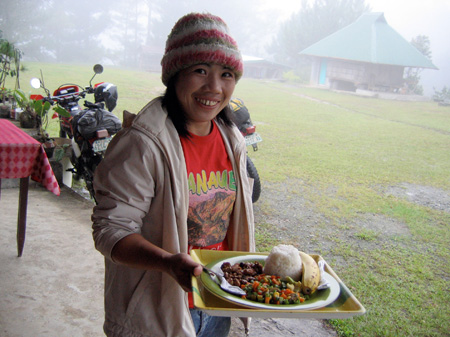
Grace, one of the resort's personnel, serves a full lunch;
our cottage by its lonesome in the background.
our cottage by its lonesome in the background.
Even the Ifugaos themselves, the Asipulo attendees from the southern part of the province whom we expected to at least be acclimatized to the temperature, thought their protective wardrobe insufficient during the evenings. The teenagers, however, could still brave the 5 o'clock early morning chill as they wasted no time dipping in the icy pool water throughout their stay, a total of three chilly morning dips in one of the resort's amenities.
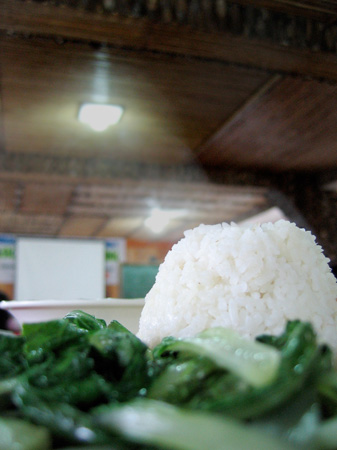
Veggie viand for us—fresh harvest from the resort's organic garden
When meal time came, we found out that one had better heed the invitation to dine because it did not take a minute to cool down newly cooked, steamy food in that weather.
❖
It is interesting that the municipality of Asipulo had thought of reviving their community newsletter and the public high schools as keen in continuing theirs. Many of the selected student-attendees live in mountain farmlands without electricity; I attribute their diligence to school work to the fact that their lives still do not revolve around the latest urban celebrity gossips, or mindless telenovellas that take up a big chunk of their time which they devote to house chores and accomplishing family tasks. Reading among students, therefore, as well as writing and being able to understand information correctly, is taken rather seriously. So unlike many youths of their age from other parts of the country.

The fourth batch of students with their adviser (seated behind), travelling from the farthest barangays of Asipulo, took all day to get to Banaue for the seminar and arrived at dinner time. Here, they still managed to listen to an overview of the sessions they missed. Right after this short session, however, the student in black (front) briefly lost consciousness due to exhaustion from the trip and the sudden Banaue chill. Mayor Andres (the resort owner) and their adviser were in command of the situation and the student was fine and participating actively the next day.
They are, however, not nescient of current events and things related to the 'now': they have cellphones because it is necessary for communications, they are aware of, and know the benefits of having a computer or television; they are knowledgeable of current music beats and do have a sense of fashion.
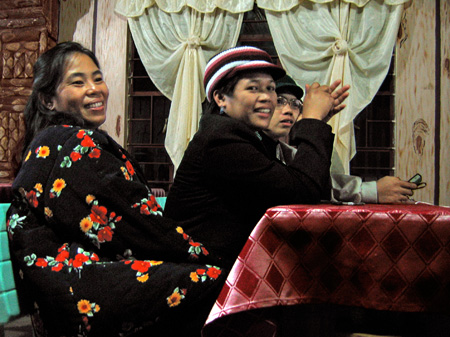
Teachers and advisers from three high schools in their own tête-à-tête
Their advisers, the female teachers whom their parents entrusted their children to, still bear the focus and dedication of many old school teachers I have come to know: attentive, intelligent and caring. I believe these kids are lucky to still not have to lose their teachers to some domestic work abroad.
The teachers were not only there as guardians to their students, but were active participants in the seminar, too, fielding their own questions, raising points and sharing their own experiences from other seminars.
After my segment on our last day, they wrote something on the board and instructed the students to sing along to an impromptu farewell song for us. A simple but very meaningful and warm gesture that helped ease the late afternoon parting of ways.
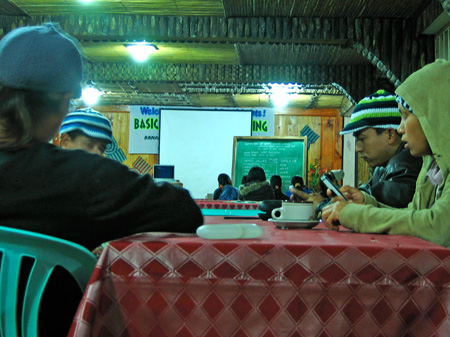
Members of the Asipulo local government Community
Relations group huddle during dinner break
Relations group huddle during dinner break
Gabby, Janno, Satur and the rest of the hardworking guys (and girl) from the local government unit of Asipulo, thank you for listening, for the opportunity to meet more new friends and the chance to impart some thoughts on media and visual literacy, media appreciation and news values.
I always look forward to trips to Ifugao province and bring home with me lessons and stories from fellow Filipinos. This event is no exception.
....
Credits and links
Venue: Banaue Ethnic Village and Pine Forest Resort, Aparanga-o, Banaue, Ifugao
Organizers: Municipality of Asipulo Community Relations Office and the United Nations Population Fund (UNFPA)
All photos by krvilla/nov.08 except where otherwise noted.


